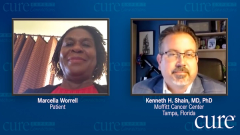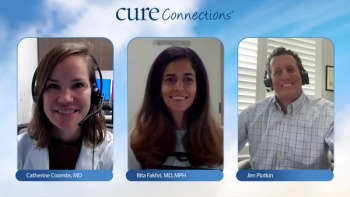
Multiple Myeloma: Maintenance Therapy and Observation
Kenneth Shain, M.D., Ph.D., discusses the use of maintenance therapy and observation in multiple myeloma as Marcella shares her own experience with multiple myeloma remission.
Episodes in this series

Kenneth H. Shain, M.D., Ph.D.: To clarify a few things, when you had your transplant, you had your pheresis done, they took the cells out, then they got you into the hospital. Back then, I think we probably admitted most people. Today, everybody is an outpatient unless you have something else going on. You just do the hotel every other day unless you get sick afterward. They gave you that huge dose of melphalan. That’s the drug you got that made you lose your hair.
Marcella Worrell: Yes.
Kenneth H. Shain, M.D., Ph.D.: You still haven’t seen your picture yet. I’m sure you’d have a big smile in the picture no matter what. Then you got the cells back, because they’re there to protect you. They had to rescue you from what that big dose of the drug did, and it took you about three to four weeks to recover enough cells where it’s safe from an infectious perspective to go back home. That’s what that time period consisted of. And then three months later, you came to hang out with me. We redid a bone marrow biopsy. We showed you that your disease did really well. You were in complete response, so we were super happy with that. We had to give you all the revaccinations, and we talked about maintenance therapy versus no maintenance therapy, if you remember that.
Marcella Worrell: Yes, I do.
Kenneth H. Shain, M.D., Ph.D.: What did we decide on that?
Marcella Worrell: We decided I would take the Revlimid pills. I did that for a good 6 months, and then I couldn’t do it anymore because the neuropathy and the cramping were still bad. I went to [Daniel] Spitz, [M.D., FACP], and I asked, “Is there any way I could stop taking it?” He did a biopsy and said, “I believe you can.” So that’s what we did, and I hadn’t had the myeloma come back for about seven years. I still came to Tampa to see you, so I could check to make sure that it wasn’t coming back. I went back and forth to see Dr. Spitz and you so that the two of you would keep….
Kenneth H. Shain, M.D., Ph.D.: Keep an eye on you.
Marcella Worrell: Yes.
Kenneth H. Shain, M.D., Ph.D.: Typically we talk about therapy up front. For your first line, you had RVd [Revlimid, Velcade, dexamethasone], then you had high-dose therapy and stem cell transplant. Then classically we want to be on maintenance therapy, and Revlimid is the most common because that’s where the best data are. But you’re an example of what happens sometimes, right? Just because I want to do something and this is what the book says doesn’t mean a person can always tolerate what we want to do. We have to treat you as a person, not as a group of people.
Marcella Worrell: Yes.
Kenneth H. Shain, M.D., Ph.D.: The problem there was you said you couldn’t tolerate Revlimid despite what we tried to do to fix it at lower doses. And so you said, “Let’s not do it,” and we said, “You know what, you’re the captain; we’re navigators trying to help you get through this. Let’s do observation.” Obviously, for you, that was a really good thing, because then you had no toxicity and you did very well for eight years with no therapy, correct?
Marcella Worrell: Yes, that’s true. I did very well. My neuropathy even went away.
Kenneth H. Shain, M.D., Ph.D.: Exactly. There were no cramps and the neuropathy finally went away.
Marcella Worrell: Yes.
Kenneth H. Shain, M.D., Ph.D.: That’s what we like. That walks us through your first line of therapy. Are there any things you take away from that that you might want to communicate with everybody about those experiences that you haven’t already stated, or do you think we’ve captured it pretty well?
Marcella Worrell: We captured it pretty well. It’s staying on top of talking to your doctors. What’s bothering you? Don’t keep it to yourself. Tell your doctors, like I did, because that’s your first line of defense now and going forward.
Kenneth H. Shain, M.D., Ph.D.: That’s a really great statement because you want to be an advocate for yourself. We thankfully have a number of drugs, and our drugs have multiple doses, so we need to make sure we can try to get patients on the right doses of drugs for them that are not toxic and remain effective. Sometimes we have to recognize that we can’t always do what we intended to. Those are all great examples, but Marcella, you said it spot on: be your own advocate. Make sure you don’t hide things from your physicians. Let them know and let them help you make decisions. That’s a great statement.
Transcript edited for clarity.

